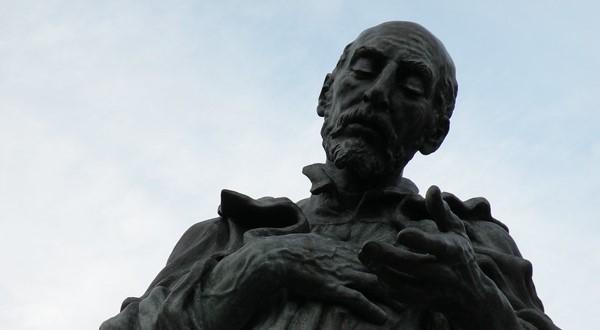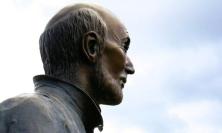Photo shared via Creative Commons (CC BY-SA 2.0)
‘Our faith in the God who became incarnate in Jesus Christ invites us to look for our incarnate God amid the most challenging messes in the Church’s past and present.’ St Ignatius of Loyola, whose own legacy presents us with some of those challenges, helps us to accept that invitation and the grace that it offers, says Thomas Flowers SJ.
Ignatius of Loyola and the other founding members of the Society of Jesus did not come together as companions in the Lord with any intention of turning back the tide of the Protestant Reformation. Yet in 1554, some fourteen years after the papal confirmation of the Jesuits, Ignatius wrote a letter to Peter Canisius noting ‘the progress that the heretics have made in such a short time, spreading the venom of their evil doctrine through so many peoples and regions’, and claiming that: ‘Our Society [has been] accepted by divine providence among the efficacious methods for repairing so much evil’.[1] Without denying the broader scope of the Society’s mission to serve wherever the need was greatest in the Church, nor intending to diminish the significance of any of the Society’s other ministries, Ignatius nevertheless here acknowledged the Society’s involvement in the fight against the Protestant Reformation as the work of God’s providential care for the Church. And he saw this divine care for the Church in strikingly polemical terms: the Jesuits were engaged in religious combat against the evils of Protestantism. Given the harshness of Ignatius’s rhetoric regarding ‘the venom’ of the Protestants’ ‘evil doctrine’, and, later in the same letter, his desire ‘to cure that which is already sickened by the heretical plague’, any attempt to characterise his position regarding non-Catholic Christians as less than hostile falls rather flat.[2] To reckon with the legacy of St Ignatius on the question of Catholic-Protestant relations demands reckoning with his uncompromisingly anti-Protestant position.
The contradiction of Ignatius the spiritual master whose insights into prayer and discernment are prized by Christians both within and outside of the Catholic Church, and Ignatius the intolerant champion of ridding the Church of the disease of Protestant teaching, bears upon a more general problem we confront when we face the reality of the Church’s history. No matter how much we contextualise the words and actions of our forebears in the faith, there always remain aspects of their beliefs, words and actions of which we are likely never to approve. As Catholics, the way we pray, think and serve as Christians today depends, in at least some part, upon the efforts of problematic people like St Ignatius, who worked to build up the Church and pass along the good news.
To reckon with the Church’s history invites us to more than the sort of apology which would seek to distance our current beliefs from the beliefs of the past. As Christians, we assuredly are invited by our faith to feel sorrow and contrition for the sins of the Christian community, for the harm we have inflicted both individually and collectively in the Church in the past and in the present. But the grace offered to us by an honest engagement with the Church’s history is more than the mere occasion for repentance. In the Church’s history we discover with St Paul that, ‘where sin increased, grace abounded all the more’.[3] In the alarmingly complicated mess of the Church’s history, we are invited to contemplate the mystery of Christ’s incarnation.
In Ignatius’s Spiritual Exercises, the contemplation on the incarnation occupies a prominent place at the beginning of the Second Week of meditations, ushering retreatants into the imaginative contemplations on the life, death and resurrection of Jesus which will be the principal material for the rest of the retreat. The particular proposal of the contemplation on the incarnation calls retreatants to begin by picturing a peculiar scene: the three persons of the Trinity, regarding the world in the moment before the Angel Gabriel appeared to Mary.[4] The Trinity thus beholds the people on the face of the earth in all their diversity: ‘some white and others black, some in peace and others at war, some weeping and others laughing, some healthy and others sick, some being born and others dying, and so forth.’[5] The persons of the Trinity, as Ignatius explains, acutely aware of the sinfulness and suffering that runs rampant among humans, ‘see all the peoples in such great blindness, and how they are dying and going down to hell’.[6] This ‘blindness’ is the blindness of sin, the determined forgetfulness of God that leads us to disregard God’s prophets, commandments and entreaties. Yet after contemplating the mess humans have made of the good world God created, the Trinity decides to send the Son to be born among them. It is a decision that defies ordinary logic – surely it would seem more reasonable for God to have given up on this world and started afresh, or to have cleaned up the world with a determined act of power. Yet God decides to come among us, to share with us in the suffering that is the result of our turning away from God’s love, and so to save us not from without, but from within.
Ignatius invites us, in the meditation on the incarnation, to consider the way that God operates in human history. For in the incarnation, God entrusts not only his message, but his very self to humans. He assuredly entrusts himself to Mary and Joseph and all those who helped to raise Jesus. But at the same time, Jesus is himself a human being, and so in the incarnation, God’s way of proceeding in the work of salvation becomes startlingly human, even as Jesus is also fully divine. We know, too, that Jesus invited the collaboration of other human persons in his saving work from the very beginning of his public life, first calling disciples to share in his life and ministry, and eventually sending them out with his authority to preach and work miracles. And at the Ascension, Jesus entrusted the continuation of his ministry to his disciples. From the Annunciation onwards, the Christian message and movement has been affected and moulded by humans: as Christians, our primary access to divine revelation passes through human experience and human hands.
Those humans, with the exception of Jesus himself and of Mary his mother, have always had hands stained by sin. And those human hands that have passed on the faith have always been particular hands of particular people with their own quirks, personalities and perspectives. Wrapped up in the mystery of the incarnation is the mystery of the historical nature of our faith and our Church: God works amid our history; amid our humanity; amid the particular human persons who encounter God, hand on tradition, and build up the Church.
The complicated mess of the Church’s history, with its frustrating, embarrassing and sinful aspects, thus comes into focus not as incidental to our faith, but as instrumental in how we come to believe. We believe in God as members of the Church that Jesus founded amid the larger mess of human life. Our faith in the God who became incarnate in Jesus Christ invites us to look for our incarnate God amid the most challenging messes in the Church’s past and present. An incarnational understanding of the Church’s history offers no excuse for the sins of the Church: sin remains sin. But God’s decision to become incarnate in Jesus Christ, and Jesus’s decision to found such a thoroughly human Church, indicates that there is grace and goodness to be found in the unlikeliest of places. For although sin abounds in the Church, grace, too, abounds.
With this perspective as guide, the case of St Ignatius’s human limitations takes on a slightly different hue. Considered historically, there is nothing really surprising about Ignatius’s attitude towards Protestants. For one thing, he knew very little, if anything, about Protestant beliefs from first-hand experience, having spent most of his life in stalwart Catholic settings. At the same time, his love for the Catholic Church and his conviction that God remained with the Church and acted through it naturally evoked a sense of dismay at those who willingly departed, and convinced others to depart, from communion with the Church. That Protestant doctrine seemed like poison to Ignatius resulted more from his conviction that the truth lay in Catholic doctrine than from any deep knowledge of the faith of Protestant Christians. All of which is to say that in his intolerance – and we could take exception just as easily, among other things, to his sexism[7] – Ignatius was a perfectly ordinary person of his day, following an entirely human logic.
Intolerance, prejudice and suspicion are part of the human mess into which God became incarnate. Yet they also have no place in God’s logic. God does not operate within our human logic of intolerance, prejudice and suspicion, so much as God operates amid the human circumstances that are, in part, shaped by these human limitations. It is unsurprising that Ignatius was prejudiced, ignorant and intolerant about some things: most, if not all, of us are. What is surprising is the way Ignatius was able to behold God’s stunningly different logic of love and care, and then share that with the world through the Spiritual Exercises. By the grace of God, Ignatius, at times, transcended his own limitations. Yet he did not cease to be human. He still had limitations. And he still had his particular, personal, way of seeing and thinking about the world. God worked with Ignatius, so that God might continue the Holy Spirit’s work of accompanying the Church, and revealing Jesus Christ.
It is, indeed, fortuitous that Ignatius – the limited, prejudiced sixteenth-century Christian – is also the author of the contemplation on the incarnation. For in the contemplation on the incarnation Ignatius allows us a means to meditate on how God sees us amid our sins and limitations. The picture that Ignatius paints of the strife and sin God beholds when he looks upon us is uncompromising; it is hard to engage honestly in this meditation without feeling the shame and sorrow of being a part of the wreck we have made of the good world God created. Yet amid such a bleak landscape, Ignatius assures us that God sees hope, and that God never forgets his deep love for human persons. And so God finds Mary, capable of being the mother of his son, and Joseph, capable of helping to raise his son, and all the other people who will become collaborators in the ministry of Jesus as he sets about the work of salvation. In Ignatius’s contemplation on the incarnation, we are assured that God is willing to work for our salvation amid the mess we have created.
Ignatius knew himself to be a sinner. So he knew just how thoroughly he was himself implicated in the sinfulness of the world and just how much he stood in need of the salvation Christ brings. Yet he also knew that God was willing to work with his limitations. That willingness, as Ignatius presents it so clearly in the Spiritual Exercises, is part of the mystery of the incarnation. Ultimately, the contradictions of Ignatius’s person invite us neither to defend nor to condemn him, but to contemplate the Trinity’s loving gaze. For where sin increased, God’s grace abounded all the more.
Thomas Flowers SJ is assistant professor of Ignatian formation in the College of Philosophy and Letters at Saint Louis University and teaches Jesuit history and spiritualty to Jesuits in formation.
[1] Ignatius to Canisius, 13 August 1554, Monumenta Ignatiana, series prima: epistolae et instructiones, vol. 12, 259.
[2] Ibid., 260.
[3] Romans 5:20 (NRSV).
[4] The meditation can be found in Spiritual Exercises §§102-109.
[5] Spiritual Exercises §106.
[6] Ibid.
[7] For Ignatius’s sexism we need look no further than his famous metaphor for the way ‘the enemy’ works upon the human spirit ‘like a woman’ in his ‘Rules for the Discernment of Spirits’. See the Spiritual Exercises §325: The Spiritual Exercises of Saint Ignatius: a translation and commentary, ed. George E. Ganss SJ (St Louis-Chicago: Loyola Press, 1992).






